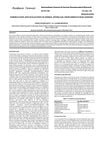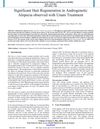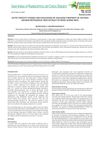
Silk sericin dressing with collagen heals wounds faster and improves scar quality better than Bactigras.

Hair RiseTM microemulsion effectively promotes hair growth and treats hair loss better than standard treatments.
52 citations,
January 2017 in “Dermatology” Swiss experts recommend specific guidelines for diagnosing and treating hidradenitis suppurativa to improve patient care.

The hydrogel with 20% Hibiscus rosa-sinensis extract was the best for potential therapeutic use.
 September 2022 in “International journal of pharmaceutical quality assurance”
September 2022 in “International journal of pharmaceutical quality assurance” The herbal shampoo is less damaging and improves hair's appearance.
 1 citations,
September 2022 in “KnE medicine”
1 citations,
September 2022 in “KnE medicine” Candlenut oil hair tonic helps mice grow hair, with higher oil concentration giving better results.
 March 2024 in “Tropical Journal of Natural Product Research”
March 2024 in “Tropical Journal of Natural Product Research” Many people in Fez-Meknes use potentially toxic plants for various health and cosmetic purposes, but more research is needed to ensure their safety.
 January 2024 in “Biochemistry Research International”
January 2024 in “Biochemistry Research International” Compounds from Ziziphus spina-christi roots show strong antibacterial and antioxidant potential.
 15 citations,
January 2016 in “Journal of cell science & therapy”
15 citations,
January 2016 in “Journal of cell science & therapy” Using a patient's own tissue for micro-grafts may effectively treat non-healing leg ulcers and relieve pain.
 8 citations,
May 2017 in “Current traditional medicine”
8 citations,
May 2017 in “Current traditional medicine” Stinging nettle has compounds that help with joint pain, arthritis, and prostate issues.
 May 2024 in “International journal of science and research”
May 2024 in “International journal of science and research” Unani treatment significantly regrows hair in young adults with androgenetic alopecia.
1 citations,
February 2024 in “Diversity” African plants can treat hair issues and may help with diabetes.
 2 citations,
May 2021 in “European medical journal”
2 citations,
May 2021 in “European medical journal” Botulinum toxins are safe for various medical and cosmetic uses, but more research is needed for long-term safety and effectiveness in hair growth treatments.
 11 citations,
February 2021 in “Trends in Food Science and Technology”
11 citations,
February 2021 in “Trends in Food Science and Technology” Impatiens plants have health-promoting compounds and are used for natural food coloring, but more research is needed to understand their full benefits.
 34 citations,
July 1987 in “The Journal of dermatologic surgery and oncology”
34 citations,
July 1987 in “The Journal of dermatologic surgery and oncology” Improved dermabrasion techniques in 1987 led to better treatment results for skin issues like acne scars.
 May 2023 in “Journal of Cosmetic Dermatology”
May 2023 in “Journal of Cosmetic Dermatology” Being overweight can cause or worsen skin problems in children, some more common in darker skin, and is often linked to insulin resistance.
 1 citations,
November 2014
1 citations,
November 2014 The document explains hair and nail biology, common hair loss conditions and treatments, oral and genital skin diseases, and the risks and treatments associated with squamous cell carcinoma.
2 citations,
August 2022 in “Animals” Essential oils may improve dogs' health and melatonin can help with their sleep and anxiety, but both should be used carefully.
 January 2024 in “Journal of Evidence-Based Integrative Medicine”
January 2024 in “Journal of Evidence-Based Integrative Medicine” Teak leaf extract may effectively and safely promote hair growth in males with androgenic alopecia.
 232 citations,
October 2015 in “International journal of molecular sciences”
232 citations,
October 2015 in “International journal of molecular sciences” Stem cells are crucial for skin repair and new treatments for chronic wounds.
 44 citations,
March 2012 in “Fitoterapia”
44 citations,
March 2012 in “Fitoterapia” Germacrone from Curcuma aeruginosa may help treat conditions related to male hormones by blocking a specific enzyme.
 September 2019 in “Asian Journal of Pharmaceutical and Clinical Research”
September 2019 in “Asian Journal of Pharmaceutical and Clinical Research” Teak seed extract is safe and reduces pain in mice.
 1 citations,
July 2021 in “Journal of Skin and Sexually Transmitted Diseases”
1 citations,
July 2021 in “Journal of Skin and Sexually Transmitted Diseases” Lipedema is a painful fat disorder in women that's hard to treat, often worsens with hormonal changes, and requires symptom-focused therapies.
139 citations,
October 2005 in “Journal of Investigative Dermatology” The nail matrix has a reduced immune response, protecting it from autoimmunity.
 47 citations,
September 2015 in “Journal of Drug Delivery Science and Technology”
47 citations,
September 2015 in “Journal of Drug Delivery Science and Technology” Nanoparticulate systems improve drug delivery by controlling release, protecting drugs, changing absorption and distribution, and concentrating drugs in targeted areas.
 32 citations,
January 2021 in “Molecules”
32 citations,
January 2021 in “Molecules” Some Middle Eastern plants may help treat diabetes and could be alternatives to current drugs, but more research is needed.
13 citations,
November 2022 in “Journal of King Saud University - Science” Juniperus excelsa, Olea oleaster, and Olea europaea have potential as natural antioxidants and wound healing agents.
 January 2018 in “International journal for pharmaceutical research scholars”
January 2018 in “International journal for pharmaceutical research scholars” Meniran extract hair tonic may stimulate hair growth in rats, with the version containing 1% menthol being more effective.
 8 citations,
September 2022 in “Biointerface Research in Applied Chemistry”
8 citations,
September 2022 in “Biointerface Research in Applied Chemistry” Quinoline alkaloids from Cinchona may help treat cancer, diabetes, fungal infections, and promote hair growth.
 July 2023 in “International Journal of Cosmetic Science”
July 2023 in “International Journal of Cosmetic Science” Biopolymers are increasingly used in cosmetics for their non-toxicity and skin benefits, with future biotech advancements likely to expand their applications.

























